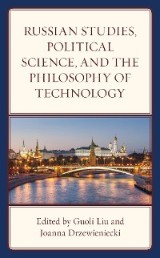Details

Russian Studies, Political Science, and the Philosophy of Technology
|
48,99 € |
|
| Verlag: | Lexington Books |
| Format: | EPUB |
| Veröffentl.: | 18.04.2022 |
| ISBN/EAN: | 9781666906363 |
| Sprache: | englisch |
| Anzahl Seiten: | 492 |
DRM-geschütztes eBook, Sie benötigen z.B. Adobe Digital Editions und eine Adobe ID zum Lesen.
Beschreibungen
<p><span>This volume presents state-of-the-art creative scholarship in political science and area studies with an emphasis on Russia. The contributors, all well-known in their specialties, share the conviction that advancement in the social sciences can only be achieved through plural methodological approaches and interaction with various disciplines. Their work in this collection provides critical analyses of key issues in Russian and post-Soviet studies. It explores the most fruitful ways of studying Russia with particular emphasis on the federal system, politics in the era of Putin, challenges of Russian foreign policy, and Russian attitudes toward democracy. The vagaries of democracy are also explored in articles on Georgia and Turkey. Additionally, this book examines the philosophy of technology with an emphasis on critical theory, eco-domination, and engineering ethics. </span></p>
<p><span>This collection presents state-of-the-art creative scholarship in political science and area studies. The contributors examine governance issues in Russia in comparative perspective and examine key theoretical issues, such as incorporating the philosophies of science and technology into political studies.</span></p>
<p><span>List of Figures</span></p>
<p><span>List of Tables</span></p>
<p><span>Foreword by Frederic J. Fleron, Jr.</span></p>
<p><span>Acknowledgments</span></p>
<p><span>Introduction by Guoli Liu and Joanna Drzewieniecki </span></p>
<p><span>I. Russian and Post-Soviet Studies</span></p>
<p><span>1. Highlighting Regional Dimensions of Political Systems: The Case of Yekaterinburg in Russia by Blair A. Ruble </span></p>
<p><span>2. The Democratic Promise of the Putin Generation? Cultural Legacies, Generational Cohorts, and the Democratic Values in Russia by William Reisinger and Marina Zaloznaya</span></p>
<p><span>3. Reflections on Post-Communist Transitions: Thirty Years after the Soviet Collapse </span><a><span>by Russell Bova </span></a></p>
<p><span>4. Reflections on Russia a Century (Plus) After the Revolution by Nathaniel I. Richmond </span></p>
<p><span>5. Making Sense of Russia’s Interests by Alexander J. Motyl </span></p>
<p><span>6. The Polish Underground’s 1944 Warsaw Uprising–A Participant’s View</span><span> by Jarosław Piekałkiewicz with Joanna Drzewieniecki</span></p>
<p><span>7. Matched-Guise Reloaded: Revising a Classic Experiment for Complex Multi-Lingual Settings by Timothy K. Blauvelt, Christofer Berglund, and Jesse Driscoll </span></p>
<p><span>8. The Future of Janus-Faced Russia and Its Continuing Structural Legacy by David Foley </span></p>
<p><span>II. Philosophy of Technology</span></p>
<p><span>9. Critical Theory and Philosophy of Technology by Andrew Feenberg</span></p>
<p><span>10. Eco-Dominion by William Leiss </span></p>
<p><span>11. Engineering Ethics: A Narrative Reflection by Carl Mitcham </span></p>
<p><span>III. Logic of Political Inquiry and Comparative Politics</span></p>
<p><span>12. Improving Russian and East European Studies by Building on Pragmatism and the Lost Legacy of the Policy Sciences by William N. Dunn </span></p>
<p><span>13. Disciplines of Political Learning: How Political Science Arises Repeatedly by John S. Nelson </span></p>
<p><span>14. Political Polarization, Electoral Support for the AKP, and the Challenge of Democratization in Turkey, 2002-2021 by Munroe Eagles and Seymen Atasoy </span></p>
<p><span>15. Perfect Deterrence Theory by Frank C. Zagare</span></p>
<p><span>16. Uncovering the Causal Mechanism in a Crucial Case Study: The Crimean War by Vesna Danilovic</span></p>
<p><span>17. Women Prime Ministers and Presidents: Empowering Women Worldwide by Farida Jalalzai </span></p>
<p><span>18. Methodological Pluralism & Analytical Eclecticism in Political Science: The Logic of Political Inquiry by Lisa K. Parshall and Frederic J. Fleron, Jr. </span></p>
<p><span>19. The Compleat Academic: Fred Fleron's Academic Troika by Claude E. Welch </span></p>
<p><span>Index</span></p>
<p><span>About the Contributors</span></p>
<p></p>
<p><span>List of Tables</span></p>
<p><span>Foreword by Frederic J. Fleron, Jr.</span></p>
<p><span>Acknowledgments</span></p>
<p><span>Introduction by Guoli Liu and Joanna Drzewieniecki </span></p>
<p><span>I. Russian and Post-Soviet Studies</span></p>
<p><span>1. Highlighting Regional Dimensions of Political Systems: The Case of Yekaterinburg in Russia by Blair A. Ruble </span></p>
<p><span>2. The Democratic Promise of the Putin Generation? Cultural Legacies, Generational Cohorts, and the Democratic Values in Russia by William Reisinger and Marina Zaloznaya</span></p>
<p><span>3. Reflections on Post-Communist Transitions: Thirty Years after the Soviet Collapse </span><a><span>by Russell Bova </span></a></p>
<p><span>4. Reflections on Russia a Century (Plus) After the Revolution by Nathaniel I. Richmond </span></p>
<p><span>5. Making Sense of Russia’s Interests by Alexander J. Motyl </span></p>
<p><span>6. The Polish Underground’s 1944 Warsaw Uprising–A Participant’s View</span><span> by Jarosław Piekałkiewicz with Joanna Drzewieniecki</span></p>
<p><span>7. Matched-Guise Reloaded: Revising a Classic Experiment for Complex Multi-Lingual Settings by Timothy K. Blauvelt, Christofer Berglund, and Jesse Driscoll </span></p>
<p><span>8. The Future of Janus-Faced Russia and Its Continuing Structural Legacy by David Foley </span></p>
<p><span>II. Philosophy of Technology</span></p>
<p><span>9. Critical Theory and Philosophy of Technology by Andrew Feenberg</span></p>
<p><span>10. Eco-Dominion by William Leiss </span></p>
<p><span>11. Engineering Ethics: A Narrative Reflection by Carl Mitcham </span></p>
<p><span>III. Logic of Political Inquiry and Comparative Politics</span></p>
<p><span>12. Improving Russian and East European Studies by Building on Pragmatism and the Lost Legacy of the Policy Sciences by William N. Dunn </span></p>
<p><span>13. Disciplines of Political Learning: How Political Science Arises Repeatedly by John S. Nelson </span></p>
<p><span>14. Political Polarization, Electoral Support for the AKP, and the Challenge of Democratization in Turkey, 2002-2021 by Munroe Eagles and Seymen Atasoy </span></p>
<p><span>15. Perfect Deterrence Theory by Frank C. Zagare</span></p>
<p><span>16. Uncovering the Causal Mechanism in a Crucial Case Study: The Crimean War by Vesna Danilovic</span></p>
<p><span>17. Women Prime Ministers and Presidents: Empowering Women Worldwide by Farida Jalalzai </span></p>
<p><span>18. Methodological Pluralism & Analytical Eclecticism in Political Science: The Logic of Political Inquiry by Lisa K. Parshall and Frederic J. Fleron, Jr. </span></p>
<p><span>19. The Compleat Academic: Fred Fleron's Academic Troika by Claude E. Welch </span></p>
<p><span>Index</span></p>
<p><span>About the Contributors</span></p>
<p></p>
<p><span>Guoli Liu</span><span> is professor of political science at the College of Charleston.</span></p>
<p><span> </span></p>
<p><span>Joanna Drzewieniecki</span><span> is a translator and editor of academic articles.</span></p>
<p><span> </span></p>
<p><span>Joanna Drzewieniecki</span><span> is a translator and editor of academic articles.</span></p>

















